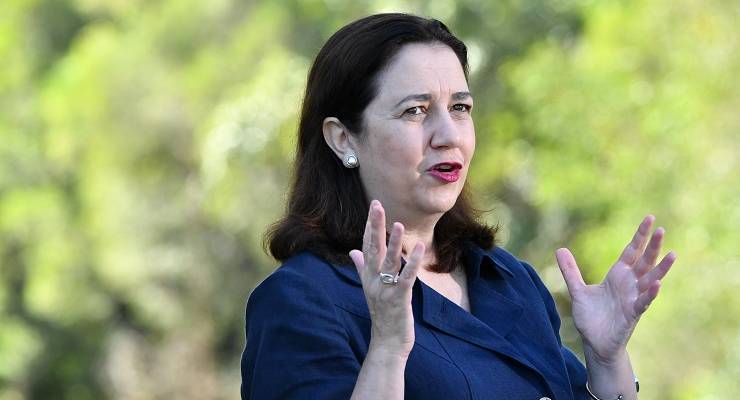
As Australia sees light at the end of the tunnel, Crikey scans the globe to see where efforts to relax lockdowns are at.
Meanwhile, the US has opened up many states despite reporting a record death toll as recently as last Friday — which raises the question, what’s happening in countries with organised despots, and who are the primary victims?
School’s back in Queensland
Queensland Premier Annastacia Palaszczuk this morning announced a partial reopening of schools starting from next week. Kindergarten, prep, and Years 1, 11 and 12 will return to school on May 11. Palaszczuk added that if everything goes to plan, all students will return to classrooms from May 25.
Elsewhere in the sunshine state, the people of Burleigh Heads clawed a mile out from the inch they had been given. A slight easing in restrictions resulted in hundreds crowding into the beach over the weekend.

Lockdowns begin to ease
Spain recorded it’s lowest death toll since mid-March on Sunday (164). From Saturday adults were able to exercise outdoors for the first time in seven weeks, and from today, while masks will be compulsory on public transport, some small businesses such as hairdressers will be permitted to open for individual customer appointments.
Italy is controversially allowing manufacturing and construction companies, takeaway businesses and some wholesalers to resume work today. This applies across the country, though movement between regions remains forbidden.
In the Middle East, Jordan it has lifted all restrictions on economic activity continuing the easing of lockdown rules that the kingdom has engaged in for the last two weeks.
Vietnam has slowly been easing their restrictions for the past few weeks, with the south-east-Asian country reporting no deaths from the virus — having sealed it’s borders, imposed mass quarantines and conducted a reported 791 tests per confirmed case, easily the highest ratio in the world.
Human rights abuses under cover of COVID-19
However necessary they may be, the emergency powers governments have been adopting in response to the COVID crisis are a perfect opportunity for their power to veer into the tyrannical.
COVID State Watch has been been monitoring the parallel death toll during the crisis as states get more and more heavy handed. The project has found shocking stats, like that in Nigeria there have been more deaths courtesy of the enforcement of virus-related restrictions than there have been from the virus itself.
The project has found that poor, minority and Indigenous people worldwide are most likely to be on the receiving end of this treatment, from Bolivia to France to South Africa. Australia does not escape this judgement, in light of the disproportionate number of fines issued in areas with large Indigenous and immigrant populations.
Brazil gives a perfect example, where dozens of public figures have signed an open letter to the government calling for greater protection for the nation’s Indigenous people, who often live in remote locations with limited access to healthcare. The letter argues continued indifference would amount to potential genocide.
Meanwhile, President Jair Bolsonaro, having spent months minimising the crisis (which has infected more than 100,000 Brazilians) as a “little flu”, addressed an anti-democratic rally of his supporters, who were calling from the closing of Brazil’s Supreme Court and congress and a return to the military dictatorship the country endured between 1964 and 1985.
Bolsonaro stopped short of explicitly calling for the return of military rule, but the protestors can’t have been too unhappy with what he had to say: “We have the armed forces at the people’s side: the side of order, democracy, liberty.”








“Vietnam has slowly been easing their restrictions…”
I worked there with AusAID for almost a decade and have been following the situation closely. VN follows the lunar calendar and celebrated Tet (new year) on 25 January. Since that time schools and universities have remained closed. In a country that values education qua education, rather than as child-minding, that is a significant decision as it means that one semester, or half a school year, has been lost.
Meanwhile, here in Australia, education has become a completely unedifying political battleground .
“Vietnam has slowly been easing their restrictions…”
I worked there with AusAID for almost a decade and have been following the situation closely. VN follows the lunar calendar and celebrated Tet (new year) on 25 January. Since that time schools and universities have remained closed. In a country that values education qua education, rather than as child-minding, that is a significant decision as it means that one semester, or half a school year, has been lost.
Meanwhile, here in Australia, education has become a completely unedifying political battleground .
The top Hun in Brazil is a reversion to a savage age long passed. No doubt a product of catholicism, he is driven, saved, blessed, anointed, inflated, righteous, triumphal, aggressive, uncaring for different people and heathens, a brownshirt, an idiot, semi-trained but unresponsive to decency, etc. He should evaporate…and save his country by an immaculate disappearance.
The top Hun in Brazil is a reversion to a savage age long passed. No doubt a product of catholicism, he is driven, saved, blessed, anointed, inflated, righteous, triumphal, aggressive, uncaring for different people and heathens, a brownshirt, an idiot, semi-trained but unresponsive to decency, etc. He should evaporate…and save his country by an immaculate disappearance.
There has never been any medical or scientific reason for locking in billions of healthy people over what is indeed just a flu virus no matter how many times you claim there was. It’s never happened before and if we did it for every flu season the world would be permanently closed.
The problem was one dumb reported out of some Oxford think thank claiming the UK would have 20-60% of the population infected and 400,000 deaths, this ”model’ was done by the same mathematician who claimed – well read his record for yourself. https://off-guardian.org/2020/04/29/lokin-20-the-lockdown-regime-causes-increasing-health-concerns/ Panorama last week in the UK confirmed that the virus had been downgraded on 19 March and this dumb report used here to extrapolate that upwards of 150,000 would die ( Paul Kelly even said, ‘do the maths”, over a report he must have known when he said it that the ”model” had been debunked by actual scientists on March 16.
“” in 2009 he told the UK Government that 65,000 could die from swine flu in the UK and worked with the World Health Organisation to predict millions of deaths from the H1N1 global flu pandemic.
Suspected resultant UK deaths from swine flu were estimated to be 457 and the global total showed 18,500 laboratory-confirmed deaths from it.””
One has to wonder why WHO still work with this bloke when he is wrong 100% of the time.